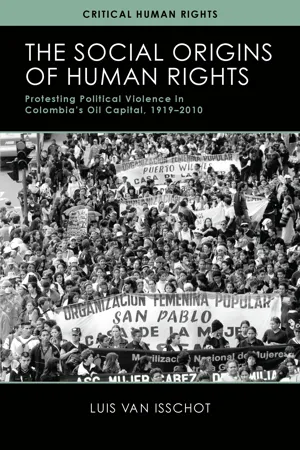
The Social Origins of Human Rights
Protesting Political Violence in Colombia's Oil Capital, 1919–2010
- 272 pages
- English
- PDF
- Available on iOS & Android
The Social Origins of Human Rights
Protesting Political Violence in Colombia's Oil Capital, 1919–2010
About This Book
Human rights activism is often associated with international organizations that try to affect the behavior of abusive states around the globe. In Barrancabermeja, Colombia, argues Luis van Isschot in The Social Origin of Human Rights, the struggle for rights has emerged more organically and locally, out of a long history of civil and social organizing. He offers deep insight into the lives of home-grown activists in a conflict zone, against the backdrop of major historical changes that shaped Latin America in the twentieth century.
Built by Standard Oil in 1919, and home to the largest petroleum refinery in the country, Barrancabermeja has long been a critical battleground in Colombia's armed conflict. One of the most militarized urban areas on earth, the city has been a regional base for the Colombian armed forces as well as for leftist guerrillas and a national paramilitary movement. In the midst of a dirty war in which the majority of victims were civilians, urban and rural social movements from Barrancabermeja and the surrounding area came together to establish a human rights movement. These frontline activists called upon the Colombian state to protect basic human rights and denounced the deeper socioeconomic inequalities they saw as sources of conflict. Through close study of the complex dynamics at work in Barrancabermeja, van Isschot shows how the efforts we describe as "human rights" activism derive in large part from these lived experiences of authoritarianism, war, poverty, and social exclusion. Through its social and historical approach, his analysis both complements and challenges the work of scholars who look at rights issues primarily through a legal lens.
Frequently asked questions
Information
Table of contents
- Contents
- List of Illustrations
- Preface
- Acknowledgments
- List of Abbreviations
- Chronology of Barrancabermeja History
- Introduction: “My basic training took place in the street”
- 1. Oil Workers, Colonos, and the Roots of Popular Radicalism
- 2. Oil and Water: New Social Movements Come Forward
- 3. War in the Countryside and the Transformation of a Company Town
- 4. Popular Protest and Human Rights Activism
- 5. Biography of a Movement
- 6. The War on Human Rights Defenders
- 7. Social Movements Respond to Catastrophic Change
- Conclusion: “This utopia, this chance to continue dreaming"
- Notes
- References
- Index